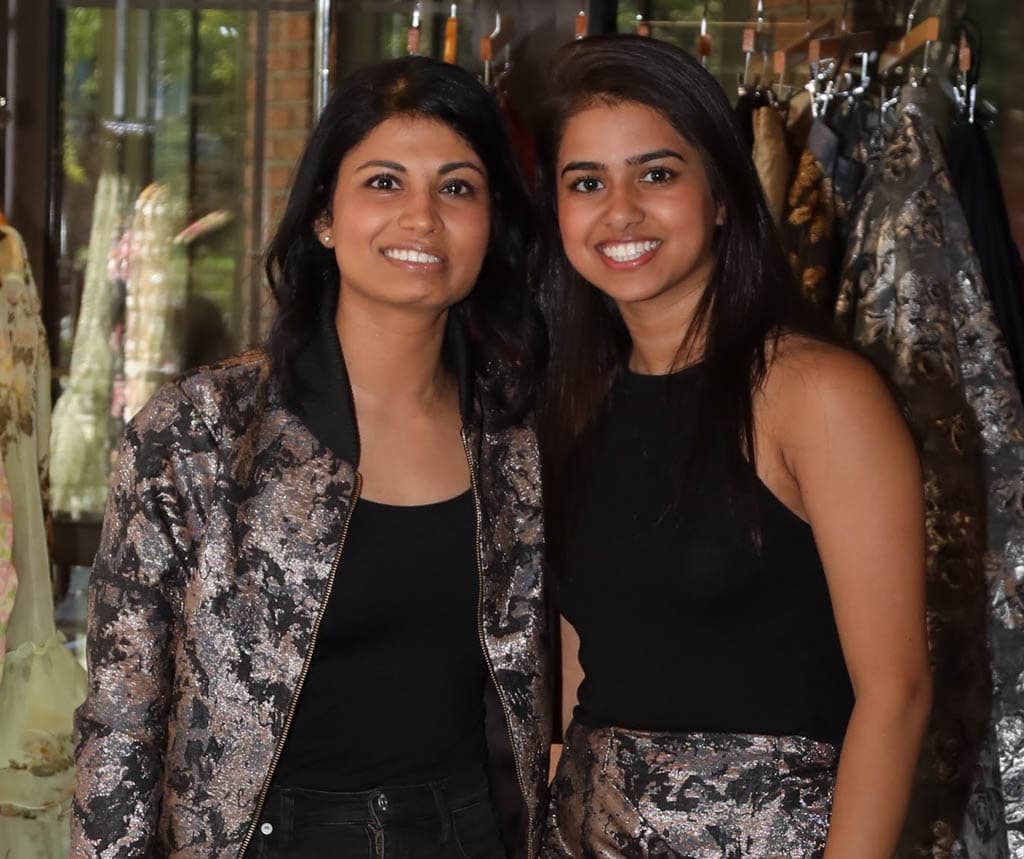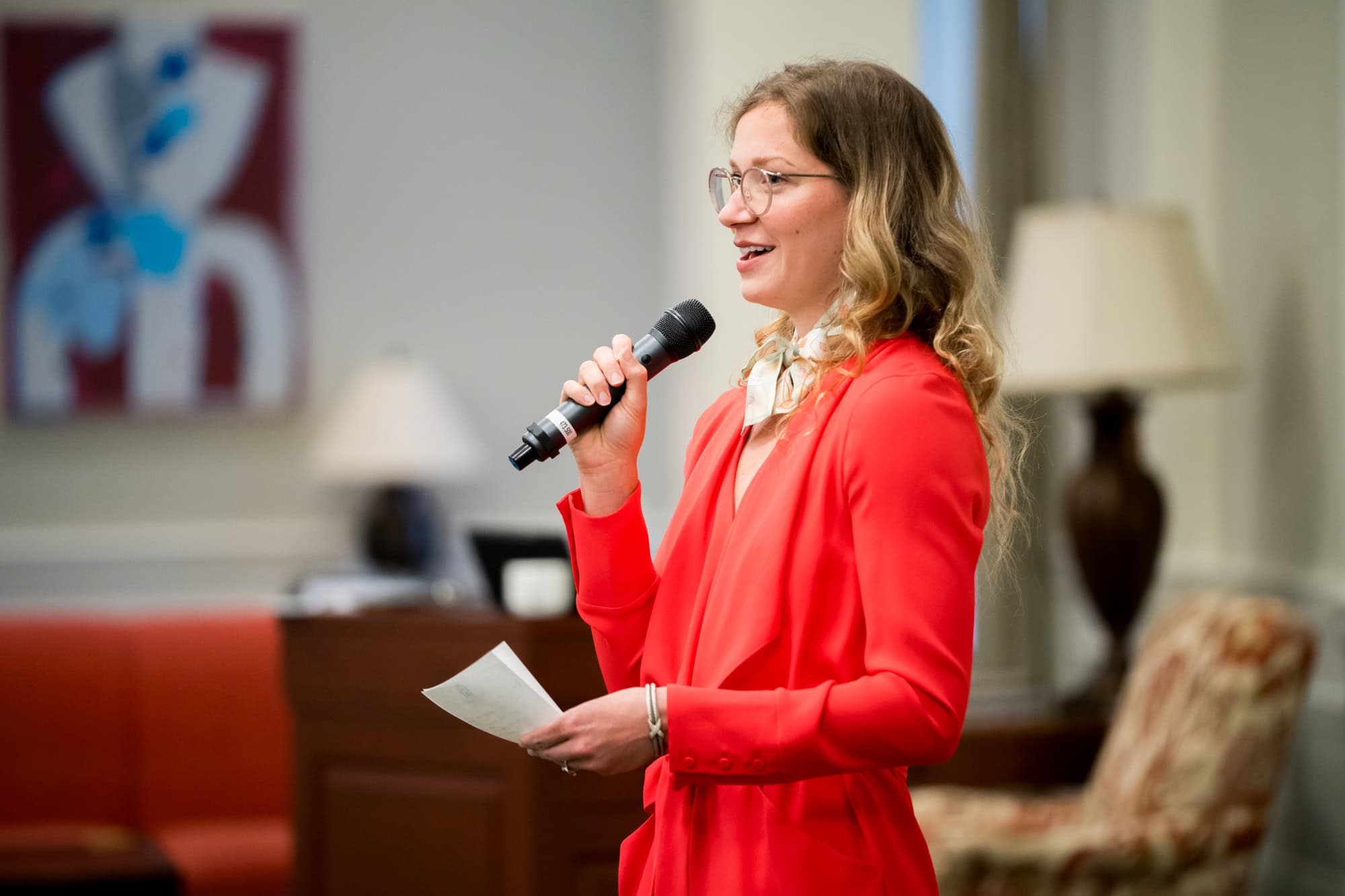
Niki Shamdasani ’15 (left) with her sister Ritika
When Niki Shamdasani ’15 left her job as chief of staff at startup accelerator Matter, she wasn’t totally sure what she’d be doing next. She’d been working at Deloitte when Corey Ford ’00 recruited her to Matter a couple of years prior. And now she wanted to try something new. At the time, she was living in New York City and loving it. She had some internships lined up in AR/VR and had always been interested in the social impact space for celebrities, but after just a few months of media and entertainment gigs, she was feeling pulled back home to North Carolina because of a new, and totally different, project.
“By October of last year, I wasn’t excited by anything I was doing in New York City,” Niki explains. “And New York is still my favorite city in the world—so I knew something was off.”
Over the previous few years, it had slowly been dawning on Niki and her sisters that no young Indian women—including themselves—enjoyed shopping for Indian clothes in the United States. When their mom took Niki and her sisters on a trip to India a couple of years ago, the Shamdasani sisters were blown away by the quality and allure of the fabrics they saw and touched in the markets there.
“For the first time, we were excited about Indian clothing,” Niki says. “I don’t think we realized how beautiful Indian clothing could be.”
So Niki, who was still working at Matter at the time, and her sister Ritika, who was in high school, started working on a side project to meet their own needs: creating high-quality, Indian-inspired occasion wear for the Shamdasani sisters and their friends. With their parents’ encouragement and support, the project evolved into a scalable business—Sani. And only something with Sani’s kind of massive potential could convince Niki to leave New York City.
“This whole thing came about because we wanted to make young Indian women fall in love with Indian clothing again,” Niki says.
And Sani’s products are truly stunning. Rich textures like georgette, chiffon, and satin. Intricate embroideries with glints of metallic and light gold. Elegant cuts that blend tradition with modernism. Sani clothing is designed for young Americans with Indian heritage, but women of all ethnicities have modeled for Sani ads and purchased Sani clothing.
Niki says Sani’s biggest challenge is getting the products in front of the right people. In India, the “occasion wear” market has evolved to accommodate more and more higher-end retailers. That change has not fully reached the U.S. market, meaning Indian shoppers in the U.S. still expect rock-bottom prices. For people who don’t know the brand, the price tags may seem high. But as soon as customers try on the clothing themselves—that’s when they get it.
So far, Sani has sold products primarily through popup sales around North Carolina.
“People who walk into our popups—once they try it on, once they feel the quality . . . Once they walk in the door, they usually end up buying stuff,” Niki says.
When Niki went in for a grant interview with the private foundation NC IDEA, she brought samples of Sani designs, along with some old Indian formalwear she’d had in the back of her closet. She asked her interviewers to compare the fabrics and designs, and to guess which sample was Sani.
“Everyone could tell on the first go,” she says.
In fact, they were so impressed that they awarded Sani a grant—funding its first fashion show, which will be in Raleigh on September 22, 2018.
Another challenge that Sani faces is that Niki’s business partner, her sister Ritika, is still in high school.
“We’re sisters, but we’ve both had to learn a lot more about each other than ever before,” Niki says. “Not just our working styles, but also how to work around each other’s schedules and how to be empathetic towards each other. We’re in very different places.”
Niki says that if she were to give advice to anyone considering launching a business with a family member, she’d recommend finding a separation between the personal relationship and the business relationship.
“We are literally living and working together,” Niki says. “It’s really nice working with family in some ways. You’re so comfortable with them that you don’t have to tiptoe around things. I can tell my sister, ‘I really hate that you’re doing things in this way.’ But it’s important to check yourself so that you are not always taking things out on the person you’re comfortable with.”
And you have to be considerate of family members who aren’t involved with the company, too. Niki and Ritika have a third sister, Mehak, who just graduated from UNC. When Mehak comes home from college, she gently reminds her family that there’s more to talk about than Sani.
But it’s hard to resist talking about it all the time, when you’re working on something you’re passionate about. Something that drew you away from New York and back home to Fayetteville, NC. Something that just won a grant. And something that’s inherently all about beauty, creativity, and imbuing confidence in the customer.
It’s just so much fun,” Niki says. “I love going to India and actually finding all the pieces to create the designs. I love going to the fabric shops. It’s incredible when you see the most beautiful piece of fabric and you think, ‘What can I do with this? How can I turn this into a piece that we’ll love?’ You get to mix and match borders, laces, embroideries . . . I’m learning so much about design.”


